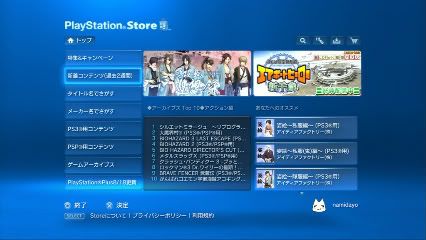
Part one concentrated on how Sony’s choice of games for the Welcome Back package could, potentially, rescue their profit margin in the long run. Despite this, they still have a long road to travel before they can confidently claim that the PlayStation brand has survived the security breach – particularly in Japan.
Japan was one of the last countries to see online play restored; and at time of writing, Sony’s PlayStation Store service has still not been reactivated there. This is a huge problem for Sony on several levels, and they must be careful when they finally resolve the issue. First and foremost Japan, while relatively small geographically, is a massively important territory in the world of videogames. Floundering there could prove to be disastrous. Not only would they lose face (not to mention money) in one of the world’s most important videogame markets, the publicity this failure would garner worldwide would see them lumbered with a new, no less awkward PR battle to fight.
That said, Sony are defending themselves from a position of strength within Japan itself. Matt, who until recently was living in Japan – and admits that he is speculating to an extent – says:
“There has been a lot of complaining online in Japan about why they are getting such a poor offering of games in comparison to the West. But like most dissent in Japan, it’s a fairly muted protest and is unlikely to make it outside of gaming forums etc.
Japanese people tend not to complain too loudly, but they do expect a certain level of service above and beyond what we look for in the West. In this way, people would expect some sort of offering from Sony as way of an apology, but they aren’t going to riot because they got stuck with Last Guy instead of inFamous.”
 To date, nothing extra has been announced in way of compensation for Japanese consumers, despite their extended PSN downtime. What is interesting here is that in Matt’s opinion, the complaining that has already surfaced amongst PS3 owners in Japan regarding their Welcome Back package will remain just that – complaining, and nothing more.
To date, nothing extra has been announced in way of compensation for Japanese consumers, despite their extended PSN downtime. What is interesting here is that in Matt’s opinion, the complaining that has already surfaced amongst PS3 owners in Japan regarding their Welcome Back package will remain just that – complaining, and nothing more.
It seems fair to presume that Sony believe this to be the case as well, and so are avoiding spending more on compensation than they deem absolutely necessary. A smart move from a business perspective. Matt goes on to say:
“I think to a certain degree Japanese people look to support their own industry/companies. Sony have long had a reputation in Japan for making goods which break very easily after a set period of time. This urban myth is widely known as the Sony Timer – yet it hasn’t stopped Sony from continuing to be the brand of choice for home electronics in Japan. A company like Microsoft would never survive such failures there.
Just for the record my PS3 packed in after three years on the dot, as did my friend’s, and strangely enough my wife’s Vaio laptop also died after three years!
Sony also operates from a position of strength in Japan. The PSP is the champion of the portables and the 360 is virtually non-existent over there. Sony shares the games market with Nintendo, but it dominates the core gaming audience, and knows it.”
We may be seeing a test of brand loyalty with an entire company’s reputation at stake… but there is reason to believe that it will prove to be not so much a gamble as it is a winning strategy carefully tailored to the region. In addition, while internet hackers are the source of Sony’s current woe, their recent activities have eased the pressure on the PlayStation brand more and more.
 Since the infamous PSN security breach, there has been a veritable tidal wave of computer hacks mainly perpetrated by Anonymous and, most of all, by LulzSec. As more and more videogame companies suffered security breaches of one kind or another – Nintendo, Square Enix, Bethesda, Codemasters, Sega and more – it became clear that any accusations of Sony standing alone as open to hackers were entirely unfounded. When the list of victims of hacking and DDoS attacks soon included the CIA, the Spanish police force, The U.S. Senate, SOCA (Serious Organised Crime Agency in the UK) and the IMF (International Monetary Fund), it became much easier for people to view Sony as victims.
Since the infamous PSN security breach, there has been a veritable tidal wave of computer hacks mainly perpetrated by Anonymous and, most of all, by LulzSec. As more and more videogame companies suffered security breaches of one kind or another – Nintendo, Square Enix, Bethesda, Codemasters, Sega and more – it became clear that any accusations of Sony standing alone as open to hackers were entirely unfounded. When the list of victims of hacking and DDoS attacks soon included the CIA, the Spanish police force, The U.S. Senate, SOCA (Serious Organised Crime Agency in the UK) and the IMF (International Monetary Fund), it became much easier for people to view Sony as victims.
When three alleged hackers reportedly responsible for the PSN hack were arrested in Spain, it emerged that at least one of the men was also implicated in cyberattacks on an energy company, two banks, and government websites in eight different countries. If Sony’s nightmare scenario of a second security breach comes to pass, it won’t do nearly so much damage to the PlayStation brand as it would have done within a week of the first. It is now abundantly clear that few, if any, internet services are impervious to such breaches.
By the end of the current fiscal year, we shall see how well Sony have recovered from the security breach. All signs are currently pointing towards the likelihood of the company emerging victorious from the ashes of their pre-April reputation… if they can restore 100% of services in 100% of regions before the death of summer, if the dissent in Japan quickly fades away with the return of the final services, and if they can avoid another major PR headache.

















http://www.gamasutra.com/view/news/35436/Suit_Alleges_Sony_Laid_Off_Network_Security_Employees_Just_Before_PSN_Breach.php
Might not be as cut and dried as it would seem. Laying off network security before a hack tends to be viewed as irresponsible.